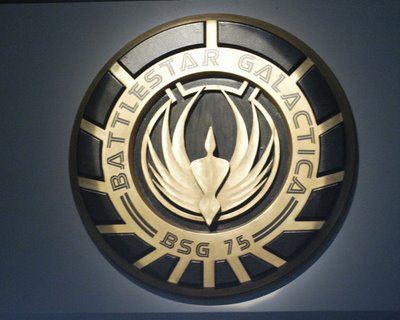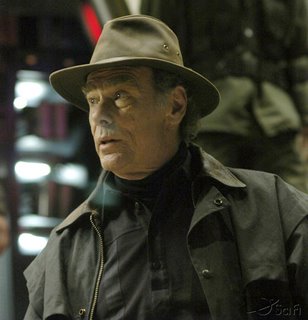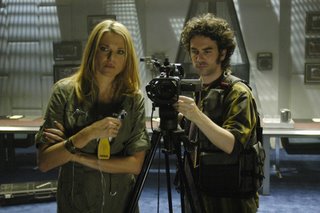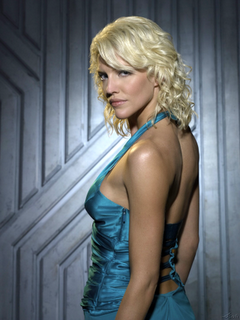 This season of Battlestar Galactica is a prime example on why I am so attracted to the science fiction genre. At its best, sci-fi (like most good stories) is an excellent form in which to explore what it means to be human (who we are and why we do what we do) and where and in what we seek meaning and purpose. And I am particularly drawn to genre because, when its done well, it explores faith in some unique ways—which this season of BG is doing that full tilt.
This season of Battlestar Galactica is a prime example on why I am so attracted to the science fiction genre. At its best, sci-fi (like most good stories) is an excellent form in which to explore what it means to be human (who we are and why we do what we do) and where and in what we seek meaning and purpose. And I am particularly drawn to genre because, when its done well, it explores faith in some unique ways—which this season of BG is doing that full tilt.Light years from last century’s campy and kitsch 1970s-originated BG, this century’s BG is critically acclaimed for its excellent writing, acting and storylines. The series follows the survivors of a polytheistic humanity who are struggling to survive the jihad of the monotheistic, now soul-burdened Cylons who come in a series of “models” (meaning there are multiple copies—though each is completely individual and sentient—of the same type running around) and are indistinguishable in appearance from humans (they look like us in every way, inside and out). Faith gets quite a bit of air-time, both in the personal lives of the characters as well as a larger movement and motivation in the battle between the two groups.
Currently intriguing is the Cylon struggle to work out their faith. As many reviewers have pointed out, the Cylon faith is a mishmash of actual religions, including elements of Christian, Islamic and Eastern faiths. Their belief in one God is similar to Christian and Islamic monotheism. Cylons consistently use language common to evangelical and fundamental Christians. The Cylon quest to wipe out humanity is seen by many critics as similar to Islamic jihad. And the Cylon process of “dying” and being “resurrected” (when Cylons are killed, their memory is downloaded to a new version of the same model) is a hat tip to reincarnation.
But what’s interesting is not the particular religions represented or how they’re mashed together (that's nothing new in our culture), but the personal struggles of the Cylon characters to figure out who God is, what he wants and "how then should we live?" After the first two episodes, it dawned on me that they are responding to these questions (or to “God”) in three basic ways—ways in which we and those around us often respond as well.
 Interestingly, the most overtly “religious” Cylon model, Brother Cavil (who pretended to be a religious priest among the humans), responds with antagonism, skepticism and agnosticism-bordering-on-atheism when it comes to the idea of God. Cavil does not believe one or any god exists, though he acknowledges he cannot prove this. Instead, he sees religion (which he labels an invention of humanity and Cylons—those made in the image of man—to assuage their guilt or existential needs) as a tool or ends to a means, which for Cavil is the annihilation of humans.
Interestingly, the most overtly “religious” Cylon model, Brother Cavil (who pretended to be a religious priest among the humans), responds with antagonism, skepticism and agnosticism-bordering-on-atheism when it comes to the idea of God. Cavil does not believe one or any god exists, though he acknowledges he cannot prove this. Instead, he sees religion (which he labels an invention of humanity and Cylons—those made in the image of man—to assuage their guilt or existential needs) as a tool or ends to a means, which for Cavil is the annihilation of humans.Of note in the season opener, Cavil advances the idea that fear is a “key article of faith.” Which reminded me instantly of Wayne Jacobsen’s He Loves Me, in which, among other things, he explores how fear (particularly of hell) is often used as a motivating factor in not only conversion but also our own relationships with God. But, as Jacobsen writes:
I am not saying in this that the fear of God is wrong, only that it is incomplete. It is the first rung on the ladder to knowing God in his fullness. He said himself it was the beginning of wisdom, but it is only the beginning. Love is the end of it. [Read more here.]
 Interestingly, it is love—the experience of it or the desire for it—that plays into the responses of a few of the other Cylon characters. For Three, a Cylon female model (played by Lucy Lawless of Xena fame), it is the desire for love that drives her quests. She is haunted by the concept of God, wanting to believe but also misguided by her drives for power, meaning and purpose—especially to know love. In a scene in last Friday’s Exodus (Part 1) (which really reminded me of King Saul’s visit to the witch of Endor), Three visits a human oracle where she receives a prophecy that she’ll find love, and that prophecy drives her in later scenes. Three is a lot like the biblical King Saul—a gifted leader but too consumed with doing things her way instead of God’s. Like Saul, she longs for God’s approval and love but in reality is more focused on herself than God. She tends to try to use God to get what she wants instead of seeking him—and that inevitably leads her to turn away from God as it did Saul.
Interestingly, it is love—the experience of it or the desire for it—that plays into the responses of a few of the other Cylon characters. For Three, a Cylon female model (played by Lucy Lawless of Xena fame), it is the desire for love that drives her quests. She is haunted by the concept of God, wanting to believe but also misguided by her drives for power, meaning and purpose—especially to know love. In a scene in last Friday’s Exodus (Part 1) (which really reminded me of King Saul’s visit to the witch of Endor), Three visits a human oracle where she receives a prophecy that she’ll find love, and that prophecy drives her in later scenes. Three is a lot like the biblical King Saul—a gifted leader but too consumed with doing things her way instead of God’s. Like Saul, she longs for God’s approval and love but in reality is more focused on herself than God. She tends to try to use God to get what she wants instead of seeking him—and that inevitably leads her to turn away from God as it did Saul. For two other characters—Sharon “Boomer” Villari (a number 8 model) and Caprica Six (a number 6 model)—it’s their actual experiences with love that affect their struggle with how to live out their faith. Near the end of last season, in the Cylon-centric Downloaded, Sharon and Caprica realize that they’ve been transformed by experiences of love they felt for two humans in their former incarnations. And that changes how they view the war:
For two other characters—Sharon “Boomer” Villari (a number 8 model) and Caprica Six (a number 6 model)—it’s their actual experiences with love that affect their struggle with how to live out their faith. Near the end of last season, in the Cylon-centric Downloaded, Sharon and Caprica realize that they’ve been transformed by experiences of love they felt for two humans in their former incarnations. And that changes how they view the war:Caprica Six: Jealously, murder, vengeance-- they're all sins in the eyes of god. That's what you and I know. That's what they don't want to hear.
Boomer: Because then they'd have to rethink what they're doing. They'd have to consider that maybe the slaughter of mankind was a mistake . . . .
Caprica: Our people need a new beginning. A new way to live in God's love. Without hate. Without all the lies. All they need is for someone to show them the way. . . .
Boomer: I'm with you.
 Ironically, it is their influence that leads to the Cylon occupation and subjugation of the humans on New Caprica (a planet the majority of humans had settled in hopes of hiding their whereabouts from the Cylons and starting a new life) at the end of last season. Caprica and Sharon hoped to find a way to live in peace with the humans, but their efforts are misguided. They attempt, with good intentions, to force peace and this new understanding of “love” on humans, but that results in mistrust, heightened enmity, and then destruction and death—results not unlike those which occur when we try to use our own effort and wisdom to bring about what we think is God’s plan of peace and love.
Ironically, it is their influence that leads to the Cylon occupation and subjugation of the humans on New Caprica (a planet the majority of humans had settled in hopes of hiding their whereabouts from the Cylons and starting a new life) at the end of last season. Caprica and Sharon hoped to find a way to live in peace with the humans, but their efforts are misguided. They attempt, with good intentions, to force peace and this new understanding of “love” on humans, but that results in mistrust, heightened enmity, and then destruction and death—results not unlike those which occur when we try to use our own effort and wisdom to bring about what we think is God’s plan of peace and love.It is Sharon and Caprica’s struggle that resonates most strongly with me. I get the way God wants us to live—in love and peace, not hate, jealously, and vengeance—but often I try to use my own efforts or wisdom to get there instead of relying on God. And too often, I try to force others into God’s love, into the image of what I think God wants them to be, behave or respond. Too often, I try to change hearts and minds by my own endeavors and understanding.
It doesn’t take long to realize relying on my own efforts and wisdom—to try to shortcut God’s working-to-do-good and bring his creation back to him—bears similar results to those of Caprica and Sharon. Instead, I need only give God what he wants: my trust. The more I live in trust of him—that he is who he says and can do what he says and that he loves and works all together for his glory and good—the more I swim in his love and it spills from me. When I take the burden to change people’s hearts off of me and trust that God is ever-working, my actions no longer focus on changing people but just on loving them.
There's lots (I mean, a tons) that could be explored about religion and how it's used for power (personal or governmental) versus faith and relationship, but this post is far too long already. I'll leave that for another day, heh.
For the most part, I’m enjoying this season of BG. The writing, production and acting continues to be superb, and the full-tilt exploration of faith has me more than hooked. I must admit, however, that the season opener included several scenes with excessive and disturbing violent and sexual content. I get why they are including most of these scenes; war really is hell and this series explores that deeply and uncomfortably. The writers are very effectively exploring what happens when our lives of wealth, peace, prosperity and (illusion of) control are stripped away. In that way, it’s not unlike Jericho (from which, however, the element of faith is largely and strangely absent as the setting is in the Bible-belt MidWest.) Yet, I’m thinking there must be equally effective but less explicit ways of depicting the struggles, atrocities and terrors we experience and are capable of inflicting on each other during war. Perhaps not.
(Images: Sci-Fi Channel) bsgctgy